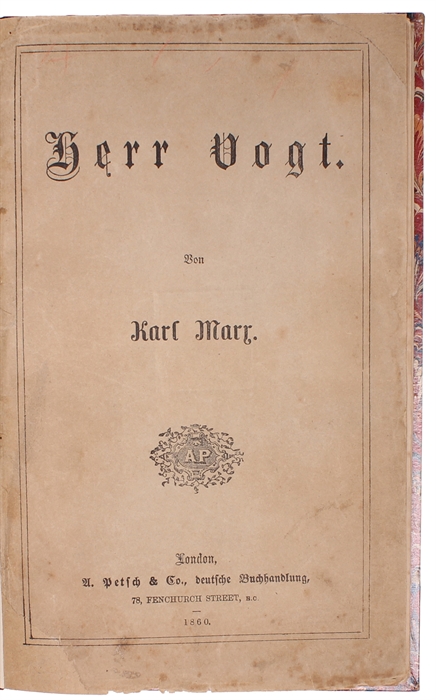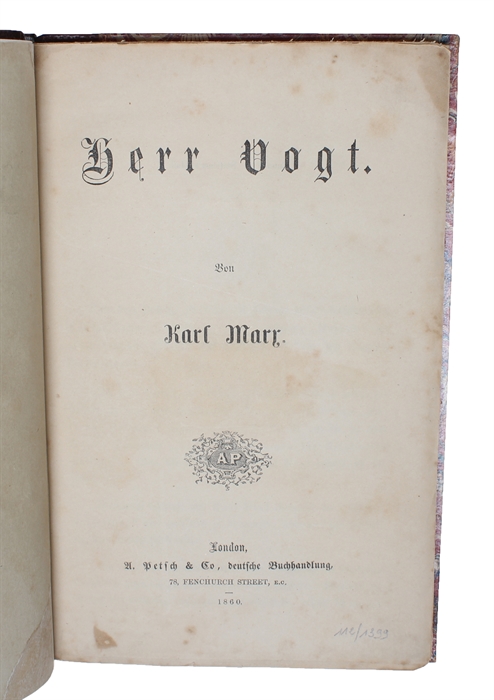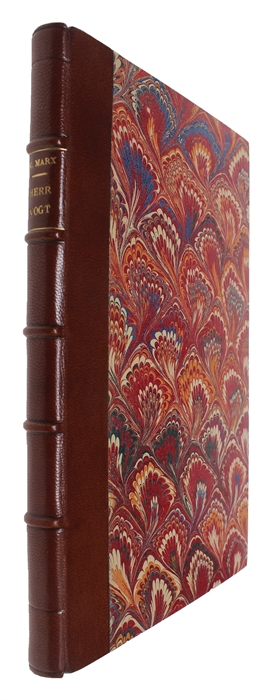MARX' STRUGGLE AGAINST DEFAMATION
MARX, KARL.
Herr Vogt.
London, 1860.
8vo. Bound partly uncut with the original wrappers in a nice recent half calf pastiche binding with four rasied bands and gilt lettering to spine. Front wrapper with marginal repairs and back wrappers with repairs with minor loss of text.
Light brownspotting to first and last leaves. A fine copy. VI, (2), (1)-191, (1, -errata) pp.
The rare first edition of Marx' landmark defense against defamation, a seminal work in his struggle for a new human society. Written in the midst of his writing of "The Capital", "Herr Vogt" constitutes the work that took precedence over this most important critique of political economy and the work that gives us one of the most profound insights into the mind of the great Marx. "Herr Vogt" is furthermore the work that we have to thank for the influence that "The Capital" and Marxist socialism did come to have upon our society.
"In 1857, Karl Marx resumed work on his critique of political economy, a process that culminated in the publication of "Capital" a decade later. He wrote a rough draft (the "Grundrisse") in 1857 and 1858, parts of which he then reworked into the "Contribution to the Critique of Political Economy", which was published in June 1859. Then, in 1861 through 1863, he wrote a revised draft of the whole of "Capital", which was followed by a more polished draft written during 1864 and 1865. Finally, he revised the first volume yet again, during 1866 and 1867. It appeared in September, 1867.
The careful reader will have noticed a rather lengthy gap in this chronology. From the second half of 1859 through 1860, Marx was not working on his critique of political economy. What was he doing instead? What was so important, so much more of an urgent priority than his theoretical work?
The answer is that Marx was fighting back against Carl Vogt's defamatory attack. He fought back in order to defend his reputation and that of his "party." ... " Herr Vogt", the book Marx wrote in order to set the record straight." (Klimann, Marx' Struggle Against Defamation).
Vogt was a prominent radical German politician and materialist philosopher who had immigrated to Switzerland, where he served in parliament and was also a professor of geology. His position on the 1859 war over Italian unification had a pro-French tilt, which resulted in the publication of a newspaper article and an anonymous pamphlet that alleged (correctly) that Vogt was being paid by the French government. Vogt believed Marx to be the source of the allegation and the author of the pamphlet.
Vogt fought back by attacking Marx. He published a short book that described Marx as the leader of a band of blackmailers who demanded payment in return for keeping quiet about their victims' revolutionary histories. The book also contained a number of false and harmful allegations against Marx, and Vogt did everything in his power to destroy Marx' reputation. Not only did he attack Marx personally, he also falsified facts and made up untrue allegations to libel the Communist League, portraying its members as conspirators in secret contact with the police and accusing Marx of personal motives.
There is no doubt that this work of slander put both Marx' own future as well as that of the Communist League at stake.
"Ferdinand Lassalle warned Marx that Vogt's book "will do great harm to yourself and to the whole party, for it relies in a deceptive way upon half-truths," and said that "something must be done" in response (quoted in Rubel 1980, p. 53). Frederick Engels also urged Marx to respond quickly, and he provided a good deal of assistance when Marx wrote "Herr Vogt".
...
Carl Vogt and the circumstances that gave rise to his defamatory attack against Marx and his "party" are dead and gone. But "Herr Vogt" and Marx's battle against defamation remain living exemplars of how one responds in a genuinely Marx-ian way-i.e., the way of Marx. Do not separate theory from practice, or philosophy from organization. Do not retreat to the ivory tower or suffer attacks in silence; set the record straight. Use the bourgeois courts if necessary. Enlist the assistance of others." (Klimann).
"Marx's Herr Vogt, almost entirely unknown in the English-speaking world. It is nevertheless one of the most brilliant of his writings. Engels considered it better than the Eighteenth Brumaire; Lassalle spoke of it as "a masterpiece in every respect"; Ryazanov thought that "in all literature there is no equal to this book"; Mehring rightly wrote of its "being highly instructive even today"." (Karl Marx on Herr Vogt - from The New International, Vol. X No. 8, August 1944, pp. 257-260. Transcribed & marked up by Einde O'Callaghan for ETOL).
Order-nr.: 56420



